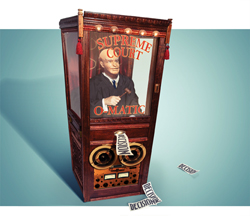The Miami Herald reports on an issue I have been thinking about recently–what happens the day after King v. Burwell is decided. In the Sunshine State the answer seems to be, we’ll worry about it later.
Nearly 900,000 Floridians could lose Obamacare tax subsidies under a new U.S. Supreme Court case, but state political leaders say they’re making no plans to deal with the potential fallout . . . .
The states in question could make the controversy go away by establishing their own exchanges. But Florida and other conservative-led states want Obamacare to fail — and they’re content right now to leave this in the hands of the U.S. Supreme Court, which leans Republican.
“I’d wait and see what happens. That’s down the road,” said Gov. Rick Scott, a phrase repeated by his fellow Republicans who lead the House and Senate in Tallahassee.
The Herald speaks to the likely political battle:
All the major potential GOP candidates for president either want to repeal or severely limit Obamacare, including the two Floridians who might seek the presidency, Sen. Marco Rubio and former Gov. Jeb Bush.
“If the Republican Party’s main candidates or nominee are campaigning to get rid of Obamacare, I can’t see the Legislature in an election year taking a separate position,” said Marc Reichelderfer, a longtime Tallahassee lobbyist and top Republican political consultant.
But state Sen. Rene Garcia, R-Hialeah, said he wants a state-run exchange “because it empowers us much more than relying on the federal government.” He said that a court ruling against subsidies in a state like Florida could force the state to reexamine establishing an exchange.
“If they get rid of the subsidies, it’s going to be a big battle,” Garcia said. “All those people receiving the federal subsidies are going to force us to answer to them. We’re going to have to do something.” …
Florida House Speaker Steve Crisafulli and Senate President Andy Gardiner both said they’ll “wait and see” what the court does before they act.
“We have discussed it, and when you look at what other states have done with exchanges, I think it’s been a real challenge,” Gardiner said. “But I think you’ll find we’re at least open for debate.”
Miami Herald staff writers Mary Ellen Klas, Kathleen McGrory and Nicholas Nehamas contributed to this report.
I suspect most other states are in the exact same position. Many hope this decision would lead to the “implosion” of the ACA.
While Florida officials won’t say what they’ll do if the court rules against the Obama administration, leaders in other Republican states are more forthcoming. When asked if Louisiana would set up an exchange, Gov. Bobby Jindal said “absolutely not.”
“If the court holds that the law means what it says, that will cause an implosion of the law,” Jindal said.
It’s difficult to get an exact number of Obamacare enrollees. The administration inflated nationwide enrollment numbers by adding in about 380,000 dental plan enrollees to keep the total nationwide figure at 7 million, Bloomberg reported.
Of course, it is not exactly correct to say that a million Floridians would be totally screwed. Many of these people would not be subject to the individual mandate, and would not need to obtain insurance.
For starters, if the high court rules against the Obama administration, not everyone who would lose a tax credit would therefore be required to buy health insurance and pay more out of pocket. That’s because the ACA provides that people can avoid buying insurance if the cost exceeds 8 percent of their income.
Other people generally have to buy health insurance or face a tax penalty. How many people is that? No one knows.
Those who will suffer the most are people with pre-existing conditions who will no longer be able to afford comprehensive plans without the subsidies. I don’t know how large this group is. Though, this could contribute to the long-feared “death spiral.”
If the IRS tax credit rule is struck down, insurers in states like Florida fear that fewer people would buy insurance because they won’t get subsidized. That would leave sicker people who need insurance in the market. Premiums would then rise further. More people would then be priced out, leaving the plans in a “death spiral.”
